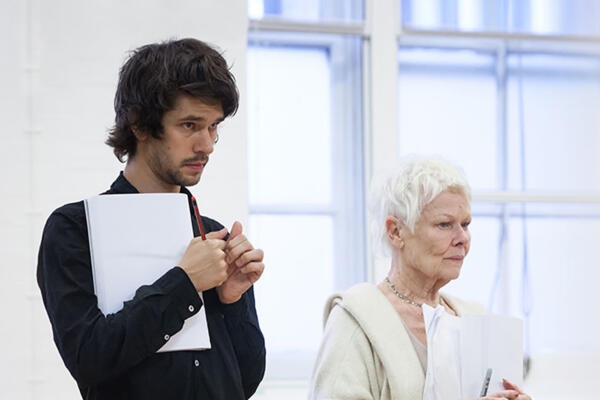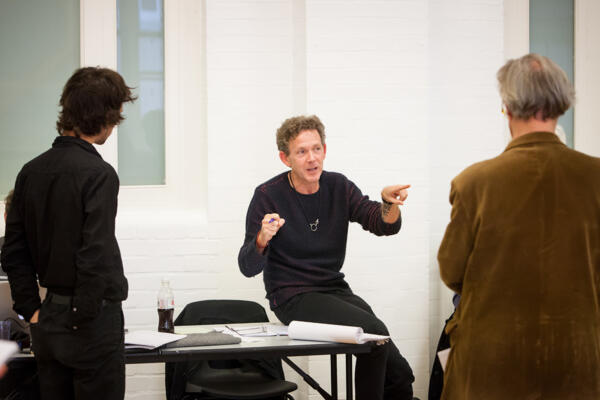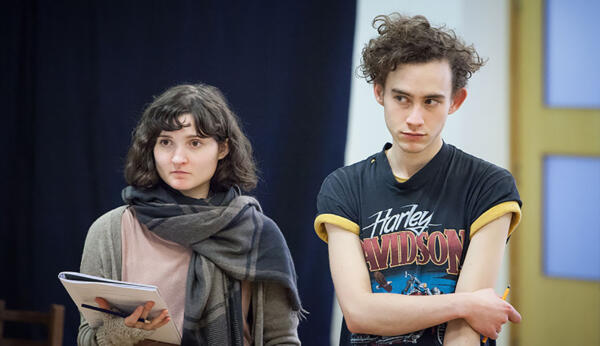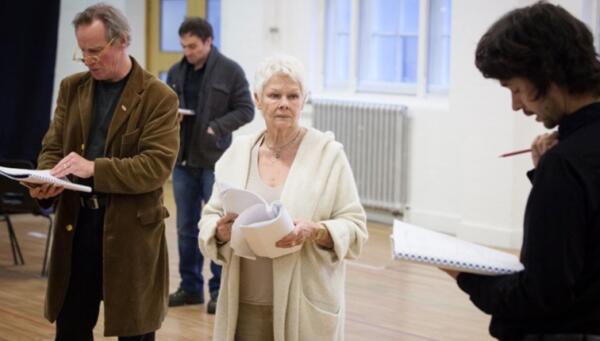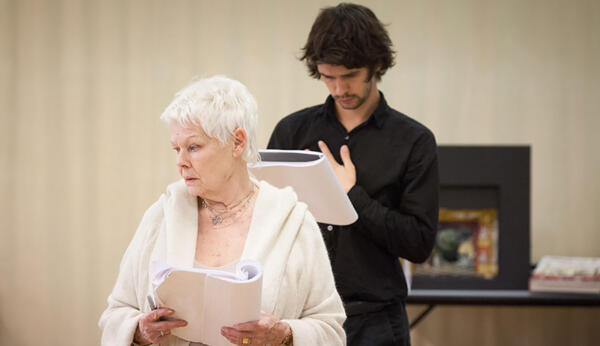Peter and Alice | Inside the Rehearsal Room
Peter and Alice– Week Two, Day Three
Mid-week of the second week of rehearsals and there are more actors in the room, as they work on a scene that involves Peter and Alice, their fictitious counterparts and the two authors, Lewis Carroll and JM Barrie. They’re revisiting the scene having looked at it briefly last week, Michael asking, ‘Who’s where?’ with regard to the blocking. He turns to DSM Clare: ‘Did you have a journey for Barrie?’
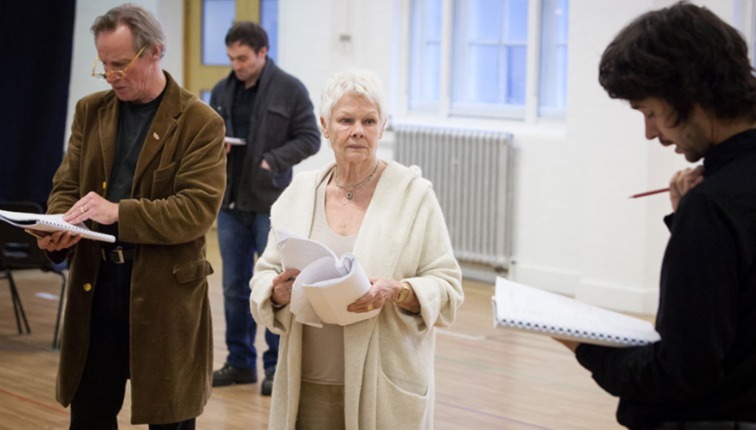
Looking at the cast on stage, Michael says, ‘That’s a very nice stage picture,’ commenting to Derek Riddell (JM Barrie) in particular, ‘It allows us to see you watching them’. Generally actors instinctively know when to adjust their positions on stage in relation to one another, but occasionally Michael encourages them to play a moment ‘on the diagonal’ to avoid standing in a line.
‘Shall we point that up by getting an entrance for you?’ he might say to one of the actors, to help emphasise a particular moment in the scene – for example, Peter’s discussion of his ‘family curse’. In this instance it’s JM Barrie’s arrival on stage. The scene’s run again, Derek judging his entrance. ‘That’s good,’ Michael observes. ‘Perfectly timed.’
In discussion, Ben Wishaw focuses on Peter’s account of his mother’s illness – specifically, the image of her fainting, an arm outstretched towards him. He comments that this would be a very traumatic image for a child. Michael makes the link between Peter’s reference to his mother’s corset and Alice’s previous reference to her sister’s: ‘It’s four and a half pages ago that Alice talked about stays and corsets, so you have to hold onto that.’
This is a complex scene in which the issue of ‘molestation’ is first raised. Michael concentrates on Alice’s dialogue, commenting: ‘The structure of that line is curious – “You were interfered with?” Where does it come from? It suggests that question needs to be asked from something Peter says.’ Judi Dench responds by explaining she’s looked for its motivation. ‘I don’t know how particular to make it,’ she says. ‘Or maybe it’s particular by the nature of the line?’ Michael considers this: ‘You have to take it from the immediate sequence.’ The discussion involves everyone in the room and Nicholas Farrell, playing Lewis Carroll, suggests it might come from Peter’s use of the word ‘exploit’ several lines earlier.
‘All we’ve been able to deduce so far is that Peter was emotionally abused,’ says Michael. ‘The author has to address this at some point in the play. It’s good for us in the audience to hear the question asked.’ He addresses Ben and Judi in turn: ‘The play demands that we question the trauma he’s experienced and she’s suppressed.’
Michael then suggests that ‘Barrie’s greatest crime was abusing the children’s innocence’. Nicholas adds to this: ‘The irony is that the two men (Carroll and Barrie) who didn’t want these children to grow up, by imposing that on them, forced them to. They themselves were both trying to keep the real world at arm’s length.’ Michael reflects on this: ‘They were both social cripples who came alive around children. It’s as if they became whole with them and were able to be free.’ Nicholas shares his biographical knowledge of Carroll, which offers a different perspective: ‘He was actually rather front-footed, politically active. John’s Lewis Carroll is very different, and that’s what we’re playing.’
Judi returns to the central issue of molestation and what actually happened between Barrie and Peter: ‘This question, ultimately, is what the audience wants to know.’ In conclusion, Michael observes: ‘There’s an invisible court case within the play. Once the physical abuse is taken away it becomes an even more complicated and fascinating story.’
Returning to the scene, in which Peter and Alice reckon with the ideas above, Judi says: ‘I don’t know how I get to the next question from there…’ Then quips, ‘Act it!’ Michael asks Ben and Judi to run the scene. ‘The two of you are feeding off each other at this point,’ he says, commenting to Judi: ‘You’ve opened the door for him.’ He asks them to practice it. ‘We’re trying to work this out together,’ says Judi, clarifying the objective of the exchange.
Michael focuses on Peter’s line: “At our story…” ‘You are absolutely arriving at a station together, you’ve arrived at your story. It helps unlock it.’ He reflects on this moment: ‘I think I just feel that, the sense of it. You just need to invest in it now.’ Ben is having difficulty with Peter’s line: “Partly… And partly that other book.” The differentiation between the two. ‘I think it needs to be a fight,’ says Michael. ‘Keep driving it through.’
Michael refers to ‘stage pictures’, commenting: ‘The axis of this scene is all on the diagonal.’ He’ll re-block a scene, occasionally asking an actor to move position: ‘Can I ask you a favour, Judi? Can you move slightly to the right on “Honestly!”. It just helps to re-balance the stage.’ He suddenly turns his attention to the fictitious Peter and Alice: ‘Are we missing the trick of having you two playing with one another in the centre of the space?’
Michael always watches the action on stage to make sure it’s balanced correctly, helping tell the story. ‘What I love choreographically…’ he’ll say of a specific moment, making suggestions to actors: ‘Can you try that section on the diagonal down to her?’ or ‘Would it help you if you started that speech on the spot?’
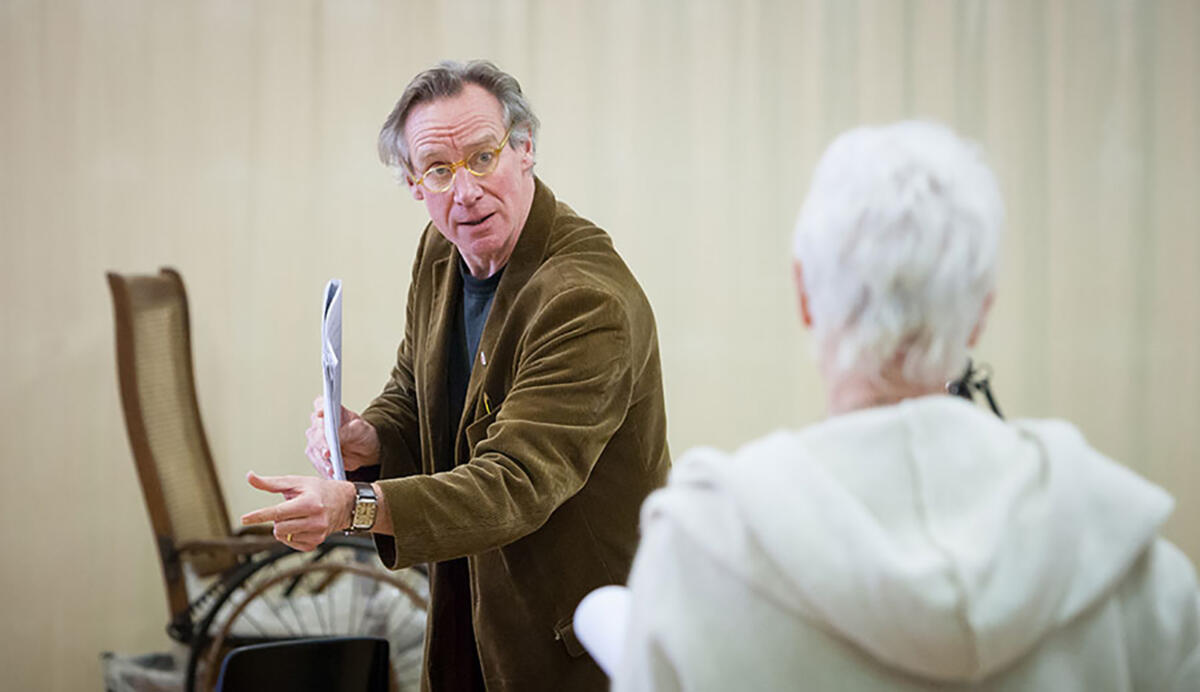
There’s some discussion with Nicholas about the scene set in the dark room, specifically how many elements within it should be mimed. Nicholas has watched several videos on You Tube showing how photographs used to be developed. ‘I think the answer is to do all of it and then we can pull back,’ suggests Michael. ‘Play with it, that’s exactly what this rehearsal is for.’ To help establish the scene, Nicholas asks: ‘Could I make a case for the “Dark Room” cloth coming in a few seconds earlier?’ Michael agrees: ‘It’s whatever makes you feel most comfortable.’ Judi wonders what pose she should strike as the young Alice being photographed by Carroll. A book of his photographs is consulted and several possibilities are explored.
